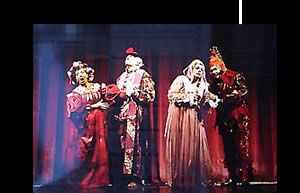|
Italian Opera
Over the centuries, many different musical influences
reached Italy by way of generations of peoples coming to settle
there, but in the late XVIth cent. melodrama was invented,
and was the most complete expression of musical civilisation
ever produced in Italy.
Italian musical theatre began life in the XVIIth
cent at the court of the Medici in Florence. Euridice,
by Jacopo Peri, was staged at the Pitti Palace for the marriage
of Maria de’ Medici to Henry IVth of France. But only
a few courtesans could enjoy the show, staged as it was to
mark a special event thanks to the sponsorship of the Prince,
and once over, the work was soon forgotten. It would be 1637
before operatic theatre was properly begun in Venice. To curb
high costs, it became necessary to stage the same show many
times for the public and this soon transpired when it became
fashionable to go to the theatre; above all, opera came into
its own as entertainment at Carnival time. Librettists and
composers of the time drew on classical mythology for their
themes though poems of chivalry by Ariosto and Tasso also
provided plentiful inspiration as well as erotic stories from
the worlds of Virgil and Homer. “Everything in life is
a farce” is a maxim from Falstaff by Giuseppe
Verdi, composed in 1893 for a libretto by Arrigo Boito.
In the world of opera itself everything is exaggerated, perhaps
even a farce. On the other hand lyrical opera has been defined
as being a literary genre in which, if a character is stabbed
in the back he doesn’t fall but just starts singing heartily!!
The most famous Italian opera writers are Rossini,
Donizetti, Bellini, Puccini and Verdi,
who all successfully gave voice to the feelings and anxieties
of Italian society of their day. And it was above all through
opera that those feelings were expressed: for example the
discontent that pervaded Italy after the Unification was more
magnificently encapsulated in Don Carlos by Verdi than
in any other literary genre.
As well, the temperament of women shines out
to perfection in opera’s female characters. A truly dramatic
female character is portrayed in Lucia of Lammermuir by Donizetti,
and Italian opera is full of real women such as Violetta,
Tosca, Santuzza, Amelia in The Masked Ball, and Gilda
in Rigoletto. In the land of the hundred cities there
are just as many opera theatres, nearly always in splendid
XVIIIth – XIXth cent. architecture, with twelve grand
theatres of fame, including the world-famous La Scala
in Milan, the Petruzzelli of Bari and The Fenice
Theatre of Venice. One great opera director is Riccardo
Muti who has in recent times perfected some highly original
and moving interpretations in particular for the operas of
Verdi.
Opera singers of the highest repute include
Luciano Pavarotti, Mirella Freni and Renata Scotto
and on the current international scene are emerging new names
such as Barbara Frittoli, Sonia Ganassi and Michele Pertusi.
home
|
|











